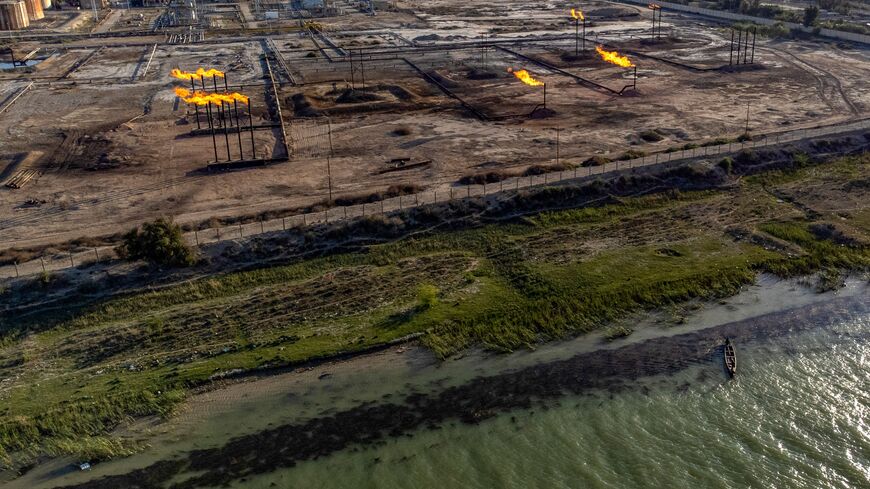The International Energy Agency (IEA) warned the Organization of the Petroleum Exporting Countries (OPEC) and its allies on Wednesday to stop cutting oil production so that oil prices do not burden global economic growth and further drive inflation.
The Paris-based organization urged the international community to shift away from fossil fuels and transition towards renewable energy. Transitioning too quickly away from fossil fuels could itself lead to inflation, according to one London-based executive.
"We have already seen that when you just switch off fossil energy and move to a transition energy that you will have a high increase in oil prices, which leads to inflation as well," Naeem Aslam, chief investment officer at Zaye Capital Markets, told Al-Monitor.
The Gulf region is remaining defiant, however, and could fare better economically than other parts of the world in 2023.
The IEA warning followed the Saudi-led OPEC+ alliance deciding earlier this month to cut oil production by 1.66 million barrels per day from May until the end of 2023. The announcement came as somewhat of a surprise, and oil prices rose above $80 a barrel in response. Prices had been as low as $70 a barrel in March.
OPEC responded defiantly to the IEA. Haitham Al Ghais, OPEC’s secretary general, said on Thursday saying that the organization should be “very careful” about what it is asking for.
“If anything will lead to the future volatility (of energy markets), it is the IEA’s repeated calls to stop investing in oil,” he said in a statement. Gulf leaders have also warned against underinvestment in oil and gas in recent months.
Gulf countries have reasons to be confident, and they have demonstrated resilience in countering historically high inflation.
"We’ve seen that inflation in the (Gulf Cooperation Council) is nowhere close enough to cause a cost-of-living crisis that we have seen in Europe, and particularly, the United Kingdom," said Aslam, pointing out that the price of cheese has risen by more than 30% in Europe. The Gulf, on the other hand, has only experienced slight price increases, he said.
The Gulf may also see better gross domestic product (GDP) growth in 2023 than other parts of the world. Global GDP is expected to fall to 2.7% on average in 2023 from 2022. This would be the weakest figures since 2001, excluding the 2008 financial crisis and COVID-19 pandemic. The forecast for Gulf Cooperation Council (GCC) countries for 2023, on the other hand, looks more optimistic at 3.6%, according to the London-based services firm PricewaterhouseCoopers.
However, this prediction falls short of the 2022 numbers for many GCC countries, according to data from Reuters. Here are the GDP growth predictions for the GCC in 2023 from a Reuters poll published on Wednesday, compared to 2022 growth values from aggregated sources.
2023 2022
Saudi Arabia 3.2% 8.7%
UAE 3.7% 7.6%
Qatar 2.7% 4.8%
Bahrain 2.7% 4.9%
Oman 2.6% 4.3%
Kuwait 1.5% N/A
Yemen N/A N/A
Gulf countries have reasons to diversify away from oil, despite the current price stability in the market. Aslam said that to maintain their resilience and avoid economic slowdown, they can subsidize industries such as tourism and travel.
Qatar, for example, experienced a strong 8% year-on-year real GDP growth in the fourth quarter of 2022, reported S&P Global Market Intelligence. This followed Doha hosting the World Cup.
Izzat Dajani is the chief executive officer of IMCapital Partners, a Middle East and North Africa investment management and corporate advisory company based in Dubai. He told Al-Monitor that GCC countries relying heavily on oil revenue will likely see the slowest growth in 2023. This is reflected in Kuwait’s lower growth forecast in comparison to countries like the United Arab Emirates and Saudi Arabia that have pushed for development of non-oil sectors.
"Fossil fuels will remain the major source of energy for the next 15 years at least, and maybe also the main source of revenue for Gulf countries during that time. Yet these steps to diversify and also attract foreign business and investment are already demonstrating their benefits," said Dajani.


.jpg?h=484aaada&itok=l9O0K7bm)





